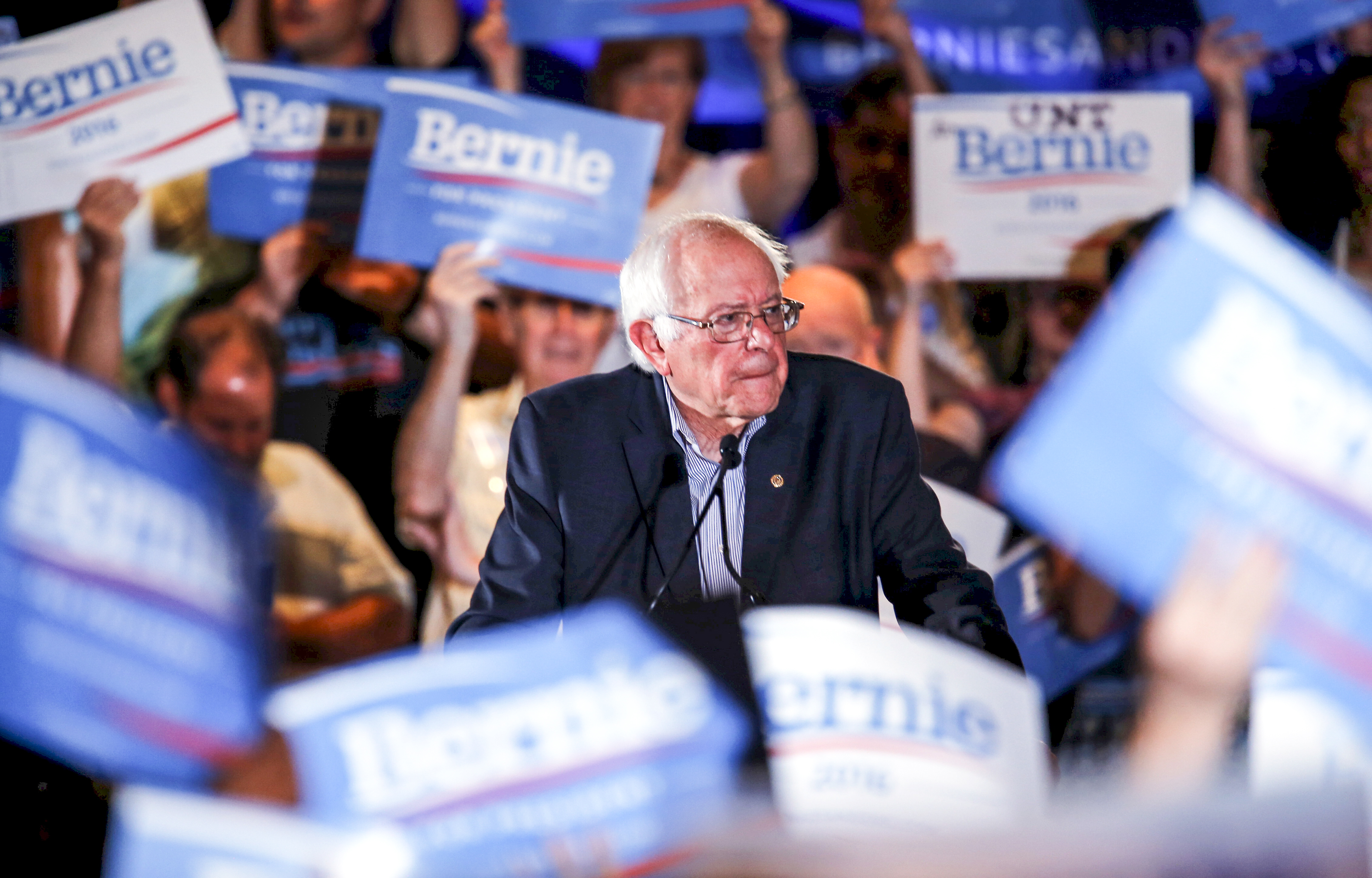Ta-Nehisi Coates is too quick to write off Bernie Sanders
Why can't socialism be a form of reparations?


Bernie Sanders' biggest obstacle to victory over Hillary Clinton is likely her strong support among African-Americans. That made it a bit of a blow to the campaign when Ta-Nehisi Coates, perhaps the most famous and respected black writer in America, took him to task for failing to support reparations for slavery.
This is an unfortunate misstep by Sanders — but also an excellent opportunity to clarify the deep reach of his brand of redistributive policy. It's also a chance for Coates to reconsider his rather hasty dismissal of socialism itself. It might provide an answer to the question of how reparations would actually function.
First, let's examine Coates' case against Sanders. If he is the candidate of the "radical left," Coates argues, and if he's the best they can serve up, then despair is the logical conclusion. "If not even an avowed socialist can be bothered to grapple with reparations," Coates writes, white supremacy will endure at least beyond the lifetimes of our children, because: "Reparations is not one possible tool against white supremacy. It is the indispensable tool against white supremacy."
The Week
Escape your echo chamber. Get the facts behind the news, plus analysis from multiple perspectives.

Sign up for The Week's Free Newsletters
From our morning news briefing to a weekly Good News Newsletter, get the best of The Week delivered directly to your inbox.
From our morning news briefing to a weekly Good News Newsletter, get the best of The Week delivered directly to your inbox.
This conclusion is unearned. First and most glaring, Coates has never actually defined what reparations would look like. In his magisterial article for The Atlantic, Coates made a brilliant moral case that United States society owes something to African-Americans. But the article's title — "The Case for Reparations" — is somewhat misleading. As Kevin Drum points out, in the piece Coates himself barely even gestured at how an actual reparations policy would be constructed. One cannot conclude that reparations is the "indispensable tool against white supremacy" without defining what the tool even is in the first place.
That was almost two years ago, and since then Coates hasn't gotten any closer to an answer. But even a fully worked-out reparations policy would not necessarily be an "indispensable tool," since one would still need to demonstrate how it would actually work against white supremacy.
And that isn't a mere theoretical concern! If we think of reparations as how most people would imagine it — a money payment for some harm — then one might reasonably reach for any relevant market values as an approximation of the amount owed. At the time of the Civil War, slaves were the single most valuable source of wealth in the nation — which also provides a decent estimate of the value of the labor that was being violently stolen.
Squarely Rooted, a public policy blog, took that value and projected it forward in time to get an estimate of what that stolen value would be worth today. He came up with a low estimate of $1.75 trillion. If we take that sum, and distribute it evenly to the roughly 45 million African-Americans, that gives each roughly $40,000. A great step to be sure, but if that eventually evaporates into the maw of racist mortgage brokers, car dealers, and banks, leaving the overall wealth gap only marginally improved, is America to consider the sin of slavery expunged? I trust Coates would not think so.
A free daily email with the biggest news stories of the day – and the best features from TheWeek.com
How about a higher estimate? Squarely Rooted comes up with an upper bound of $12.5 quadrillion (or six times the entirety of world income since 1950). That's probably excessive, but it's also probably more accurate than the smaller figure cited above. Slavery was inextricably intertwined with early capitalism, in both America and Great Britain. For something like 80 years the entire system worked on the backs of slaves — and all the wealth created since then is built from that first foundation.
Slavery, in other words, is a crime so vast that it would be impossible to provide restitution of similar magnitude without dismantling the entire country (and that's not even taking Jim Crow and similar smaller crimes into account). It also opens up an enormous can of worms, as it's only one of many such crimes — what of the theft of half of Mexico, or the ethnic cleansing of almost the entire American Indian population? Surely those people deserve reparations if African-Americans do.
Thus do we return to Coates' overly hasty case against socialism. One problem here is using Sanders as a stand-in for the radical left. In fact, the senator's self-identification as a "democratic socialist" is largely affect; in a European context he'd be a firmly moderate social democrat, and his favored policies are right in line with the Democratic Party's progressive wing. (For better examples of true radicals, I suggest W.E.B. du Bois, Adolph Reed, or Martin Luther King, Jr.)
A true program of democratic socialism — perhaps Karl Polanyi-style — would be far more aggressive than anything Sanders has outlined, and could unquestionably serve as a part of an ongoing positive force against racism. One could conceive of this as part of a program of reparations, but instead of dynamiting the nation's entire social system as built on a moral atrocity, ensure that black Americans are getting an equal cut of its current fruits. The reality is that American racism is extremely heavily defined by class — to pick one example out of many, poor black men are roughly 10 times as likely to be imprisoned than high-class black men.
Bernie Sanders should not have so lightly brushed off reparations as a topic. It was glib and obtuse. Yet his proposal for directing federal resources at poverty-stricken populations because poor people are disproportionately black and brown is far better than Coates gives it credit for. Race-neutral redistribution and welfare are by necessity anti-racist. Full democratic socialism would be even more promising.
Ryan Cooper is a national correspondent at TheWeek.com. His work has appeared in the Washington Monthly, The New Republic, and the Washington Post.
-
 Why is the Pentagon taking over the military’s independent newspaper?
Why is the Pentagon taking over the military’s independent newspaper?Today’s Big Question Stars and Stripes is published by the Defense Department but is editorially independent
-
 How Mars influences Earth’s climate
How Mars influences Earth’s climateThe explainer A pull in the right direction
-
 ‘The science is clear’
‘The science is clear’Instant Opinion Opinion, comment and editorials of the day
-
 The billionaires’ wealth tax: a catastrophe for California?
The billionaires’ wealth tax: a catastrophe for California?Talking Point Peter Thiel and Larry Page preparing to change state residency
-
 Bari Weiss’ ‘60 Minutes’ scandal is about more than one report
Bari Weiss’ ‘60 Minutes’ scandal is about more than one reportIN THE SPOTLIGHT By blocking an approved segment on a controversial prison holding US deportees in El Salvador, the editor-in-chief of CBS News has become the main story
-
 Has Zohran Mamdani shown the Democrats how to win again?
Has Zohran Mamdani shown the Democrats how to win again?Today’s Big Question New York City mayoral election touted as victory for left-wing populists but moderate centrist wins elsewhere present more complex path for Democratic Party
-
 Millions turn out for anti-Trump ‘No Kings’ rallies
Millions turn out for anti-Trump ‘No Kings’ ralliesSpeed Read An estimated 7 million people participated, 2 million more than at the first ‘No Kings’ protest in June
-
 Ghislaine Maxwell: angling for a Trump pardon
Ghislaine Maxwell: angling for a Trump pardonTalking Point Convicted sex trafficker's testimony could shed new light on president's links to Jeffrey Epstein
-
 The last words and final moments of 40 presidents
The last words and final moments of 40 presidentsThe Explainer Some are eloquent quotes worthy of the holders of the highest office in the nation, and others... aren't
-
 The JFK files: the truth at last?
The JFK files: the truth at last?In The Spotlight More than 64,000 previously classified documents relating the 1963 assassination of John F. Kennedy have been released by the Trump administration
-
 'Seriously, not literally': how should the world take Donald Trump?
'Seriously, not literally': how should the world take Donald Trump?Today's big question White House rhetoric and reality look likely to become increasingly blurred
